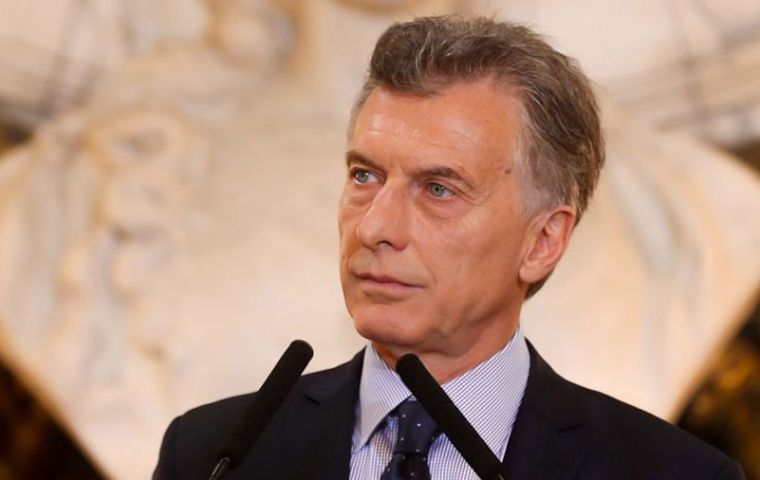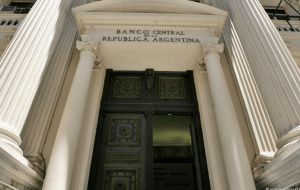MercoPress. South Atlantic News Agency
Argentine inflation in February, 3.8% and 51% in twelve months; central bank new measures
 Inflation rose 3.8% in February, INDEC said, as President Mauricio Macri struggles to bring down prices ahead of key national elections this year.
Inflation rose 3.8% in February, INDEC said, as President Mauricio Macri struggles to bring down prices ahead of key national elections this year.  Argentina’s central bank president Guido Sandleris slammed “too high” inflation and promised new measures to curb one of the steepest inflation rates in the world
Argentina’s central bank president Guido Sandleris slammed “too high” inflation and promised new measures to curb one of the steepest inflation rates in the world Argentina’s stubbornly high inflation accelerated again in February, the government said on Thursday, sparking the central bank chief to pledge new measures to rein in rising prices that have dogged the South American economy over the last year.
Inflation rose 3.8% in February, the National Institute of Statistics and Censuses (INDEC) said, as President Mauricio Macri struggles to bring down prices ahead of key national elections this year.
The rise marked the second straight month where inflation has accelerated, underscoring the challenge facing Argentina’s leadership who are battling to stem a slide in the peso, rein in inflation and dig the country out of a recession.
Argentina’s central bank president Guido Sandleris held a press conference later in the day, slamming “too high” inflation and promising new measures to curb one of the steepest inflation rates in the world.
Sandleris said the central bank would extend its goal of zero growth in the monetary base to the end of 2019 but would not freeze the exchange rate as a measure to lower inflation.
He added a non-intervention trading band for the peso agreed with the International Monetary Fund last year would be tweaked so it depreciated more gradually than the current track.
The band, which sets an upper and lower limit for the peso to trade against the dollar, will depreciate at 1.75% per month starting from the second quarter versus 2% currently - meaning it should guide the peso lower more slowly.
The February inflation increase, the sharpest since October, took 2019 year-to-date inflation to 6.8%, and rolling 12-month inflation in the month was 51.3%, INDEC said.
Fueled by a weak peso, consumer prices in Argentina rose 47.6% in 2018, which analysts said was the highest annual rate in nearly three decades, hitting the country’s spenders as wage growth failed to keep apace.
Earlier this month economists raised their forecast for 2019 inflation to 31.9% from a previous estimate of 29.0%.




Top Comments
Disclaimer & comment rules-

-

-

Read all commentsSummary of main causes of inflation
Mar 17th, 2019 - 11:29 am +11. Demand-pull inflation – aggregate demand growing faster than aggregate supply (growth too rapid)
2. Cost-push inflation – higher oil prices feeding through into higher costs
3. Devaluation – increasing cost of imported goods, also boost to domestic demand
4. Rising wages – higher wages increase firms costs and increase consumers’ disposable income to spend more.
5. Expectations of inflation – causes workers to demand wage increases and firms to push up prices.
HTH.
Wiki-
Mar 15th, 2019 - 11:39 pm 0“there is now broad agreement among economists that in the long run, the inflation rate is essentially dependent on the growth rate of money supply relative to the growth of the economy.”
What is the problem in Argentina?
Is it very little economic growth compared to the supply of money?
(I know, I know, it's Macri. Unless it's a socialist in charge, in which case we can ignore inflation, 'cause nothing is as important as socialism, the true religion)
In Venezuela with an annual inflation of 838, 000%, a zero level of economic growth might explain this infinite inflation rate.
Because, no matter the supply of money, any number divided by 0 equals infinity.
Is it not so much the supply of money as consistently low to no economic growth?
What is it about this culture? (I know, I know, it's not the Argentines, it's Macri)
I'd be afraid if this country just went to the dollar (dollarized). They might just wipe out the whole global economy.
Many MP commentators were enthused three years ago when Mauricio Macri won the 2015 presidential election. Finally a market-friendly guy after those pesky populists!
Mar 16th, 2019 - 05:40 am 0Now they are all disenchanted and gone -- all but Jonaz and bushpilot, who now find nobody else to blame for the current disaster -- nobody but “the Argentines,” who Jonaz calls “a nation of losers.”
I would say the only loser here is that who is unable to see past his prejudices and utterly unable to understand the real world.
This is class warfare, people, the Argentine oligarchy doing what it does best: a giant effort to sink the poor, the middle class and even some of the well offs who don't belong to the “red circle.” Inflation is the best instrument to operate a transfer of wealth, from the working Argentines to the pockets of a few: Large landowners, banks and financial institutions, privatized energy companies, and highway toll operators.
Commenting for this story is now closed.
If you have a Facebook account, become a fan and comment on our Facebook Page!